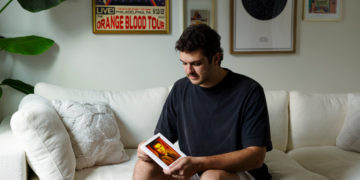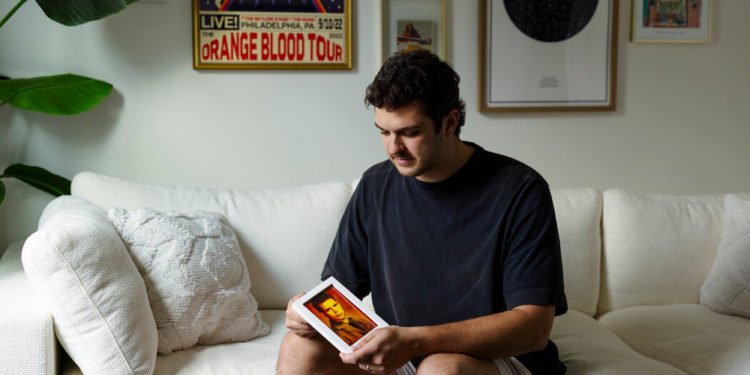In the weeks that followed Sept. 11, 2001, when David Skiba came home from lengthy search-and-rescue shifts at ground zero, his wife would take his shoes and place them outside.
“That’s people’s ashes,” Matt Skiba, their son, remembers his mother saying as she carefully handled the dust-covered boots.
David Skiba, a 37-year-old New York state trooper, was working in internal affairs in Albany at the time of the attacks, but he was quickly reassigned to the site of the World Trade Center. There, immersed in thick clouds of toxic dust, he helped supervise rescue and recovery efforts, according to affidavits signed by his colleagues.
He worked 12 hours at a time, commuting from his home in Waterford, N.Y., to Lower Manhattan, and often staying at the Hotel Pennsylvania in Chelsea. From September through November, he was the member of his unit who was most frequently assigned to the site, one of the affidavits said.
Three years later, he started feeling sick. In January 2005, he was diagnosed with lung cancer. On Feb. 19, 2008, at the age of 43, he died.
Soon after, the Skibas joined a group of families fighting for recognition and compensation from the World Trade Center Health Program and the September 11th Victim Compensation Fund. At issue was the program’s cancer latency policy, which stipulates that many cancers diagnosed before Sept. 11, 2005, cannot be considered linked to the attacks, and therefore those victims and their families are not eligible for federal benefits.
Under the policy, “solid cancers” — those that feature growths in organs as opposed to the bloodstream — can be considered connected to exposure at ground zero only if a “latency period” of least four years elapsed before they were diagnosed. Solid cancers include lung cancer, stomach cancer and brain cancer. The latency period for blood cancers, such as leukemia and lymphoma, is less than one year.
“The fact that his cancer got diagnosed eight months early has repeatedly slapped us in the face,” Matt Skiba, 26, said. “If you were down there helping people, you should get recognition no matter what, in my opinion.”
Most of the families petitioning for changes to the program’s latency policy have received benefits from the New York state government. Some have had their loved ones’ names included in memorials around the country. But for all of them, the policy remains one of the last ways that the aftermath of 9/11 remains unresolved 23 years later.
Families that are deemed eligible for the program receive a one-time cash payment of at least $250,000.
But more than any sum of money, the families whose loved ones do not qualify want to make sure they are recognized by the federal government as victims of the attack and are honored for their sacrifice.
“Latency is a very interesting discussion, because there’s only a finite number of people that are in the situation where the federal programs don’t cover them,” said Matthew McCauley, a lawyer representing victims’ families, including the Skibas. “They had to draw a line, and it’s just next to impossible to overcome that line.”
A retired police officer and paramedic, Mr. McCauley also jumped in to help at ground zero on Sept. 11 and during the days that followed. He had just finished law school and was working at the federal courthouse in Foley Square when he watched through his open office window as the second plane hit. He said he can still feel the heat.
He lost numerous friends over the years to cancers related to their work at the site, including his best friend, Brian Payne, a firefighter from Westchester who died in 2022.
“Why am I not as sick as other people?” Mr. McCauley said. “Why did one of my closest friends die of cancer two years ago? I have no idea.”
Determining an accurate latency period is difficult, according to Lyall A. Gorenstein, a thoracic surgeon and lung cancer expert at Columbia University Medical Center. The high levels of asbestos detected at ground zero caused a range of health complications, he said, and asbestos is known to be an influencing factor in the development of lung cancer.
That said, accurately attributing causation after a short interval is a challenge.
“You can’t say for certain. Saying conclusively that it had no role is difficult,” Dr. Gorenstein said, referring to asbestos exposure at ground zero. “But when the latency period is greater — 10 years or more — then, statistically, that probability of causation definitely increases.”
Nilda Macri has appealed to the World Trade Center Health Program numerous times to receive federal recognition that her husband’s death was connected to Sept. 11, repeatedly combing through his medical records, filling out new paperwork and pleading with representatives.
Her husband, Frank Macri, grew up in Connecticut and was an aspiring actor before he joined the New York Police Department. On Sept. 11, he rushed to the scene as soon as the first tower was hit.
He and his partner were guiding people away when the second plane struck. They both ran, and Mr. Macri grabbed a light pole and held on as the gust of smoke engulfed them. He was hit with so much debris, Ms. Macri said, that his corneas were scratched.
In the years that followed, Mr. Macri never complained of any symptoms, his wife said. But he was constantly worried about getting sick from his exposure to ground zero. He was training for a triathlon two years later when back pain sent him to his doctor, and he left with a lung cancer diagnosis. He died in 2007 at the age of 51.
The exhaustive appeals process led Ms. Macri to experience anxiety attacks, she said, bringing back memories of Sept. 11 and the subsequent years as her husband battled his illness. Her latest appeal, she said, will be her last.
“I just can’t believe that they would put us through this,” Ms. Macri said. “But at the end of the day, I feel like they’ve made their decision, and I think they’re just going to continue to deny anyone within that four years.”
Dolores Weiner has also felt discouraged in her attempts to fight the cancer latency policy. She and her brother, Thomas Weiner, were both New York City police officers who responded to ground zero after the attacks. Dolores Weiner, a detective, said she developed autoimmune issues as a result, while her brother was diagnosed with stomach cancer and died in 2003.
Detective Weiner became the caretaker for their mother, who died two years ago. To bring her comfort toward the end of her life, Detective Weiner promised her that she and Thomas could celebrate in heaven when he was finally recognized.
“For Washington to be denying these families, it’s crazy, right?” she said. “People fight and fight for years, and it’s totally unfair.”
A spokesman for the World Trade Center Health Program said that the program “recently performed another literature review to determine if any new literature supports a change to the Program’s latency policy.” Such a review is standard procedure, the spokesman said, and the results are expected to be released “in the coming months.”
The program introduced the latency policy in 2012 and has revised it before. In 2023, uterine cancer was added to the list of related health issues eligible for compensation. Before that, the policy was last updated in 2015.
Mr. Skiba was only 3 years old when the attacks took place and 10 when his father died. In recent years, he has worked with Mr. McCauley on his father’s case.
He scours Google for new studies, pores over news stories and reads medical files — anything he can think of that might help. He has presented before the Centers for Disease Control and Prevention, which oversees the World Trade Center Health Program, citing a study published in 2020 that focused on Sept. 11-related cancers, including lung cancer, that developed 3.3 years after exposure to ground zero.
While it’s hard to relive the details of his father’s illness and death, Mr. Skiba enjoys talking about him. The worst part of losing him at an early age, he said, was not getting to know him well enough.
“I like making people laugh — like that’s my No. 1 thing to do in life. And my mom always tells me that I’m funny, but my dad was funnier,” Mr. Skiba said. “And I like when she says that, but it kind of sucks, because I didn’t get to ever really see that side.”
Still, his father inspired his chosen profession. Mr. Skiba became an aerospace engineer, designing plane engines, because his father, an amateur pilot, used to take him to air shows.
“I have a couple big goals in life,” he said. “But the biggest there is, is trying to get my dad the recognition I think he deserves.”
The post 23 Years After 9/11, Families of Cancer Victims Fight for Benefits appeared first on New York Times.



















